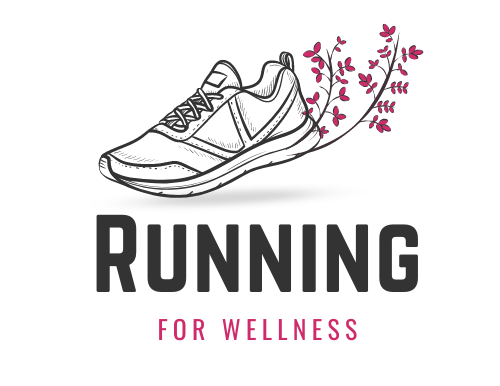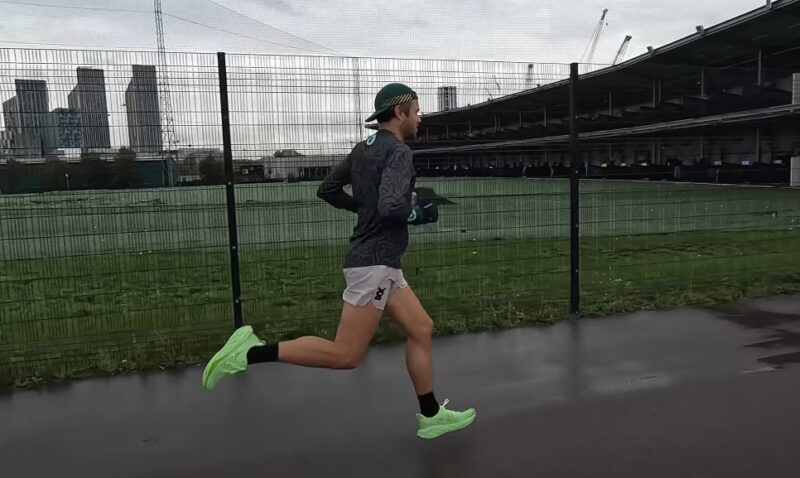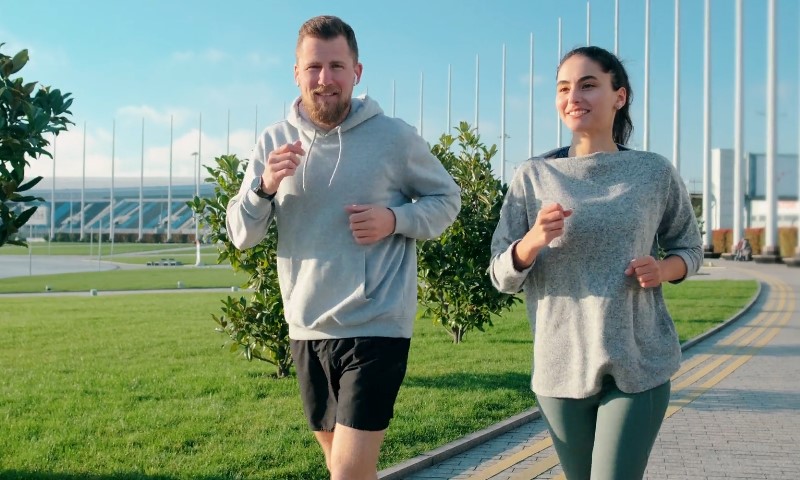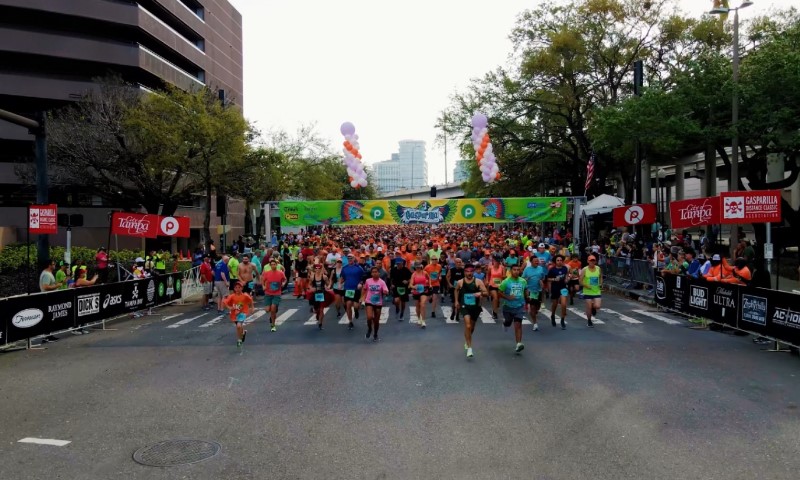When someone first decides they want to run a half marathon, their first goal is usually just to finish. After they reach that goal, it is common to want to achieve some sort of time goal. A very popular one is the goal of running a 2-hour half marathon pace.
Running a 2-hour half marathon pace can be challenging, especially if you are a beginner. But is definitely possible. It took me 4 half marathons before I ran a half marathon in under 2 hours. It felt like a monumental feat.
Running a 2-hour half marathon pace means that you need to maintain a pace of 9:09 throughout the entire half marathon.
Hitting the sub-2 hour half marathon time really is attainable for most people if you take the steps to put in the right training.
When I first started out as a runner, I didn’t have much educational background in running and I didn’t work with a coach. This didn’t exactly set me up for success.
Don’t make the same mistakes I made! Follow these tips to help you achieve your goal of running a sub-2 hour half marathon! And I definitely recommend giving coaching a try so that you don’t have to go it alone. You will save so much time and headache if you have someone experienced on your side to get you to your goal.
Table of Contents
ToggleTips To Run a Sub 2 Hour Half Marathon Pace
1. Keep Your Easy Runs Easy
This tip is probably the hardest rule to follow and also the most important. Keep your easy runs easy. When you’re trying to achieve a pace goal, it is so tempting to speed up your runs thinking that it will help you to run a faster half marathon.
This is actually not true. 80% of your runs should be at an easy, aerobic pace. You should be able to hold a conversation and not be totally winded. This will help you to build up your aerobic capacity and prepare you to run long distances much better running all-out for every run, or for a mile.
2. Incorporate Speed Training Into Your Plan Appropriately
Another element of a good training plan is to have speed training (quality sessions) incorporated into the plan appropriately. As I mentioned before, you should try to stick to 80/20 when it comes to easy/hard running.
20% of your runs can be more challenging and will help you to become a faster runner. Just remember to keep your hard days hard and your easy days easy.
3. Practice Your Half Marathon Pace

As I mentioned above, to achieve a 2 hour half marathon pace, you need to maintain a pace of 9:09 (on average) throughout the entire 13.1 miles. In order to do this, your training plan should include at least some practice runs at that goal pace.
This will be added in sparingly and you will not be doing all your training runs at this pace. But doing some training at this pace will get your body and mind used to holding this pace and preparing for the race.
4. Use a Training Plan Designed to Get You to Your Goal
You should be using a training plan that is specifically designed to get you to your goal of running the half marathon in 2 hours. Your training plan should include pacing strategies that specifically support this goal.
As I mentioned above, this should include easy runs, hard runs, half marathon pace runs, as well as a weekly long run to prepare you for the distance.
5. Strength Train

Strength training is a great way to train your muscles to become stronger so that a speed goal is more easily attainable for your body.
Doing strength training for runners will help you to build stronger glute, hip, and leg muscles. Also, doing strength training for your upper body will help improve your posture and your running form.
It can also help to reduce your risk of injury.
6. Dynamic Warmups and Stretching
Dynamic warmups and stretching are super important for runners and are often overlooked. I recommend doing a few minutes of dynamic warmups before you start your runs. High knees, leg swings, butt kicks, etc. get your muscles warmed up and ready to run.
Stretching your muscles for a few minutes directly after finishing your runs can also help to stretch out your muscles and decrease your risk of injury. It also helps to alleviate muscles being sore the next day.
If you aren’t already incorporating dynamic warmups and stretching into your running routine, I highly recommend it!
7. Work with A Coach

I may be biased, but I really do believe that working with a coach is one of the best ways your improve your odds of reaching your goal. Not only do you get their guidance and expertise, but you also get accountability and support.
We all have moments of doubt and frustration when we train for a goal, and the coach’s job is to be there to support you and help you get back on track when you fall off.
As humans, we all benefit from having someone there to help us get back on track. Trust me when I say that working with a running coach can make all the difference.
Working with a coach significantly improves your chances of earning a medal after the race, like one of those we can find at GSJJ.
8. Fuel & Hydrate Well
Your body is the instrument that you will be using to get you to your race goal. It only makes sense that you need to fuel and hydrate it well if you want it to perform at its peak capability.
Just like you wouldn’t race a car unless it was filled with gas and had its oil changed when needed, you shouldn’t race using your body without properly fueling and hydrating it either.
9. Get Enough Sleep

This one might seem like a no-brainer, but it’s such an important tip that a lot of people miss. A well-rested body will perform better when put to the test. Aim to get 7-9 hours of sleep so that your body has the rest and energy it needs to run your best.
10. Adjust Your Mindset to Build Mental Strength
Remember that training is a process. You’ll have good runs and bad runs and it’s all part of the process.
Use the training as an opportunity to build mental strength. Push yourself to persevere through the hard times.
Practice positive affirmations and mantras. Dig deep for your inner strength.
The training will teach you how to keep going when things get tough. You can take those lessons with you into the race. You’ll learn that you are capable of pushing through challenges. You’re stronger than you think.
Achieving a sub-2-hour half marathon requires maintaining an average pace of approximately 9 minutes and 9 seconds per mile (5 minutes and 41 seconds per kilometer). To develop the speed, endurance, and efficiency necessary to sustain this pace, incorporating structured speed work and interval training into your regimen is essential.
Interval Workouts
2 ways to confirm you’re improving at running
1- Better performance & health metrics
•Longer duration at low HR •Faster easy pace at same HR •faster interval splits •faster recovery in between interval splits •race and time trial results •body recomposition •lower RHR…— David Abbott (@runliftrunlift) May 15, 2024
Interval training consists of alternating between high-intensity running and recovery periods. This method enhances cardiovascular fitness, increases the lactate threshold, and improves running economy.
- 5K Pace Intervals: Run 800 meters (approximately half a mile) at your 5K race pace, followed by a 400-meter (quarter-mile) jog for recovery. Repeat this cycle 4 to 6 times. This workout enhances speed and simulates the demands of faster running.
- 10K Pace Intervals: Run 1,000 meters at your 10K pace, followed by a 400-meter jog for recovery. Repeat 3 to 5 times. This helps develop the ability to sustain a faster pace over longer distances, improving stamina and endurance..
Tempo Runs
Tempo runs, also known as threshold runs, involve running at a “comfortably hard” pace—typically at or slightly above your lactate threshold. This pace is often described as a 7 out of 10 on the Rate of Perceived Exertion (RPE) scale.
Fartlek Training
Fartlek, meaning “speed play” in Swedish, introduces unstructured bursts of speed within a continuous run, making training both fun and effective.
Long Runs
Long runs form the foundation of endurance training and are crucial for building aerobic capacity and muscular endurance.
Strides
Strides are short, fast runs of about 100 meters that focus on form, leg turnover, and speed development.
Recovery Runs
@louisphillips12 It’s an ART (which I only just learnt) #fyp #running ♬ Summer – Instrumental – Devinney
Recovery runs are short, easy-paced runs designed to promote blood flow and aid in muscle recovery without adding significant stress to the body.
Training Zones and Rate of Perceived Exertion (RPE)
Understanding training intensity is crucial for optimizing workouts. Here’s a guide to training zones and their corresponding perceived exertion levels:
- Zone 2 (Easy): A comfortable pace where conversation is easily maintained. Ideal for recovery and long runs.
- Zone 4 (Threshold): A sustainable hard effort where speaking in short sentences is possible. Used for tempo runs and threshold workouts.
- Zone 5 (VO2 Max): A high-intensity effort where speaking becomes difficult. Used for speed intervals and short bursts of maximal effort.
By incorporating these structured workouts into your training plan, you can build the speed, endurance, and efficiency necessary to achieve a sub-2-hour half-marathon goal. Consistency, progressive overload, and proper recovery will be key to success on race day.
Related Posts:
- 25 Simple Running Motivation Tips To Get You Moving
- How Far Is a Half Marathon? Everything You Need to Know
- Top 400 Hilarious Gym Quotes to Keep You Motivated
- Half Marathon Training Plan for Beginners - Simple…
- How Long Does It Take to Train for a Half Marathon?
- How Can You Start a Career as a Running Coach?







